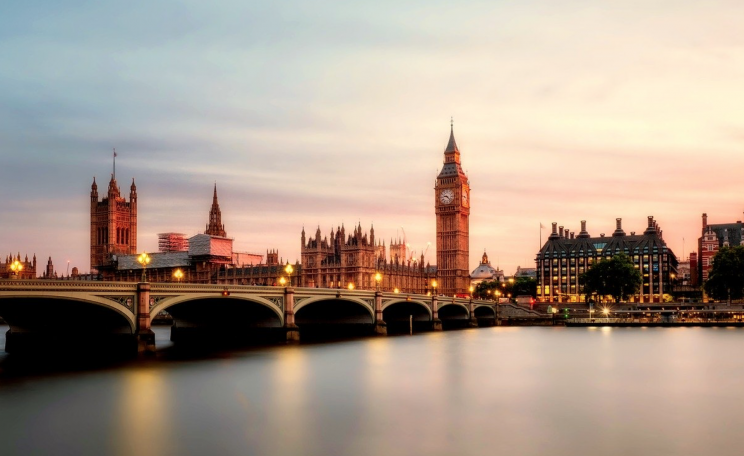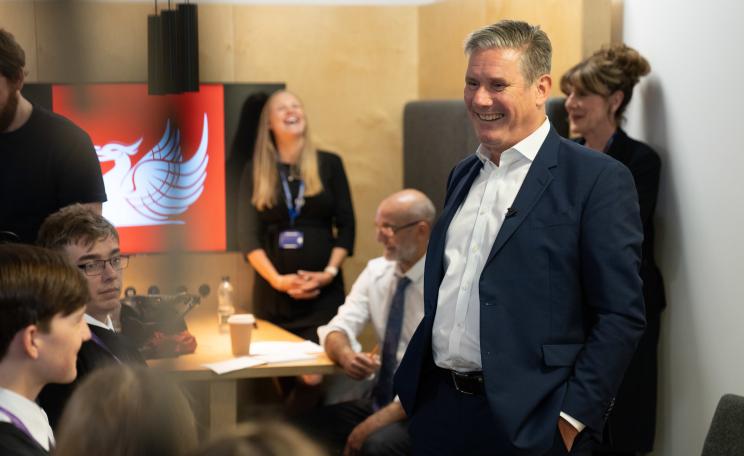-
Shadow business secretary Rebecca Long-Bailey masterminded Labour’s Green New Deal, backing a 2030 zero-carbon target despite trade union pressure for a more conservative goal.
Keir Starmer worked pro bono on the McLibel trial in the early nineties, helping London Greenpeace activists Helen Steel and David Morris fight McDonalds’ libel suit for handing out leaflets critical of the company.
Nandy was shadow energy and climate secretary for nearly a year. In September 2015, Global Justice Now praised her “bold and refreshing” proposal for a “just, sustainable and democratised” energy system. That December, Nandy called for a moratorium on fracking, citing environmental and safety concerns.
Voting records
The 'Guardian climate score', which rates MPs’ votes on key climate policies, gives Long-Bailey one hundred percent (for five out of five votes) and Starmer no score, since he voted only two of a possible six times. Nandy gets one hundred percent (for nine out of nine votes).
The less targeted Public Whip gives Long-Bailey ninety-four percent on climate, Starmer seventy-seven percent, and Nandy sixty-four percent.
And on many key issues the candidates agree.
In 2015 all four candidates voted against allowing fracking in national parks, areas of outstanding natural beauty and near sources of groundwater.
All have promised to reverse privatisation of energy, water, rail, buses, schools, royal mail, broadband, the justice system, council services and the NHS. And all voted against Heathrow expansion in June 2018, except Long-Bailey who was absent (she says she was at a constituency meeting) but who has recently stated her opposition.
Environment
But the candidates do differ on some environmental issues.
In January, Nandy downplayed the need for rapid decarbonisation targets, telling an Open Labour hustings: “When we argue about 2030 or 2050, we let the Tories off the hook”. Labour for a Green New Deal called the remark “disappointing”, adding that a 2050 target would be “deadly for millions”.
All contenders voted for the first phase of HS2 (London to West Midlands) in March 2016, except Starmer, who voted against, condemning its “devastating impact on thousands of my constituents”. All abstained on the second phase (West Midlands to Crewe) in July 2019 except Long-Bailey, who voted for.
In July 2016 Starmer voted to renew Trident. Long-Bailey and Nandy voted against. Nandy called nuclear power “particularly important” in meeting the UK’s Paris climate treaty goals. In March, Long-Bailey stressed that Labour had been “consistent” in its support for nuclear power.
In February 2016, Nandy told the Carbon Brief that local communities should get the same decision-making powers on fracking as on wind farms, adding that Labour “aren’t opposed” to fracking, but that there are “economic and environmental arguments that need to be weighed”.
Rights
The candidates also differ on some touchstone issues for Labour.
Long-Bailey has said she will support strikes “no questions asked” and promised to place trade unions “at the heart” of Labour’s programme. In 2017, Nandy said Labour should stop supporting rail strikes - the last Conservative manifesto has pledged to force rail unions to keep running services during strikes.
Starmer supports free movement of people after Brexit, as does Nandy – despite claiming in 2017 that the policy had “allowed a skilled and mobile population across Europe to gain advantage at the expense of the rest of us.”
Long-Bailey has said a hard Brexit will rule out free movement, and Labour must “recognise” this but “fight for as much fairness as we can get”.
Long-Bailey alone voted against June 2015’s Conservative welfare bill on second reading, the rest abstaining (Nandy while on maternity leave). The bill slashed twelve billion pounds from social security, including through cuts to tax credits. Then-backbencher John McDonnell said he would “swim through vomit” to oppose the bill, which he condemned as “blaming the poor for their own poverty”.
Antisemitism
On antisemitism, Starmer called for automatic expulsions for “clear” anti-Semitism in July, adding: “If you deny we’ve got a problem, that’s part of the problem.” Rebecca Long-Bailey has said the party is “right” to expel prominent members for publicly “diminishing” the issue.
In January, the Jewish Board of Deputies issued a list of demands on antisemitism, including a call for Labour to use an “independent” body to adjudicate complaints, automatic suspensions for members who defend those already suspended, and accepting the controversial International Holocaust Remembrance Association working definition of anti-Semitism.
All leadership candidates have agreed to the Board’s demands, though deputy leadership candidate Richard Burgon has said he “won’t be signing” its pledges, while his opponent Dawn Butler has said “I don’t want to jump the gun”.
Critics object that the demands will lead to an unaccountable disciplinary process, a rush to judgment and guilt by association. They also argue the Board is not a neutral arbiter when distinguishing anti-Semitism from criticism of Israel, having helped organise protests to defend Israel during its 2006 war against Lebanon.
Power
Nandy resigned as shadow energy and climate change secretary in June’s “coup” in January 2016, after claiming that she had no “secret plan to go and kick Jeremy out”. Shadow home office minister Starmer resigned alongside her, and in July said he backed Corbyn’s opponent Owen Smith “100 percent”. Long-Bailey remained loyal to the elected leader.
Starmer’s record has raised concerns about his willingness to compromise with power.
Starmer has said his values include “the rule of law”, and that “everyone is subject to the law, we cannot act in an arbitrary way". Yet critics have attacked his record as Director of Public Prosecutions from 2008-2013 – in particular choosing not to prosecute the police officers who killed innocent Brazilian Jean Charles de Menezes on the London underground in July 2005.
In 2013, lawyer Matt Foot of Birnberg Peirce accused Starmer’s Crown Prosecution Service of pushing violent disorder charges on protesters who would previously have received cautions or light penalties. Journalist Wail Qasim reports Starmer’s CPS “aggressively” prosecuted demonstrators who had been penned in and rushed by mounted police during 2010’s anti-tuition fees protests in London.
Alfie Meadows, who nearly died of a brain injury from a police baton blow, was pursued by the CPS through three trials between 2012 and 2013, the last of which acquitted him. Qasim reports that Meadows’ lawyers wrote to Starmer when the second trial collapsed, asking him to drop the charges, but Starmer refused.
Meadows’ mother told the press “the whole family has been through two years of total agony.”
Starmer’s attacks on benefit claimants have also drawn fire. In 2013 he advised prosecutors to crack down on benefit “cheats”, hiking maximum sentences to ten years and abolishing the threshold for minor offences, saying it was “vital that we take a tough stance” and that he was “determined to see a clampdown”.
Tax expert Richard Murphy called Starmer’s move “disproportionate” and “absurd”, noting that the cost of benefit fraud is “massively outweighed by unclaimed benefits”, while tax fraud costs the exchequer “at least 50 times” more, is rarely prosecuted, and incurs small penalties.
Brexit
Journalists have dubbed Momentum-backed left-winger Rebecca Long-Bailey a “continuity Corbyn” candidate. Others suggest she is closer to John McDonnell, Labour’s shadow chancellor, who was readier to appease the party’s soft left and centre, including on Brexit. Some on the left implicate this watered-down populism in Labour’s heavy general election defeat and loss of majority-leave seats.
Starmer, by contrast, has been dubbed a soft-left, “continuity Miliband” candidate, but without the latter’s commitment to austerity – occupying a centre ground that Corbynism has shifted to the left. But the shadow Brexit secretary’s critics argue his alignment to right-wing party elites poses a threat to the left and the membership.
Keir Starmer is known as a committed remainer. At September 2018’s party conference, he surprised Labour’s front bench by announcing “nobody is ruling out remain as an option” in a second referendum. His campaign has played up his credentials as a principled campaigner, competent manager and natural leader.
Staff
Starmer has hired Morgan McSweeney, who worked for Blairite leadership contender Liz Kendall in 2015; former health industry lobbyist Ben Nunn, who helped Owen Smith’s bid to depose Corbyn in 2016; and Matt Pound of right-wing faction Labour First, who last year claimed his job was to “organise full-time against the Hard Left”.
When an audience member at Starmer’s campaign launch last month challenged him on Nunn’s health lobbyist background, Starmer dismissed the question and said he “won’t tolerate” comments about his staff.
Starmer’s defenders call him a unifier with a diverse team – including Kat and Simon Fletcher, who campaigned for Corbyn in 2015. But critics question if such figures are Corbynite “true believers” or more flexible left-wingers: Simon Fletcher was chief of staff for London mayor Ken Livingstone, and both he and Kat Fletcher helped Ed Miliband run for leader in 2010.
So what are the prospects for the candidates? A 15 January poll for Labourlist had Long-Bailey and Starmer tied fifty-one to forty-nine percent. But YouGov two days later had Starmer claiming two thirds of the vote to Long-Bailey’s one third.
This Author
Tim Holmes is an 'active bystander' and also researcher, writer and editor. He tweets at @timbird84.
Image: LabourList.







